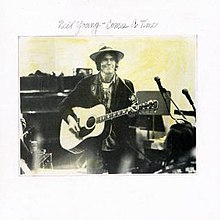Comes a Time
| Comes a Time | ||||
|---|---|---|---|---|
 |
||||
| Studio album by Neil Young and Crazy Horse | ||||
| Released | October 2, 1978 | |||
| Recorded | November 28, 1975 – November 21, 1977 | |||
| Studio | Triad Recording, Ft. Lauderdale, FL; Columbia Recording Studio, London; Wally Heider Recording Studio, San Francisco, CA; Woodland Sound Studios, Nashville; Sound Shop, Nashville, and Broken Arrow Ranch, Redwood City, CA | |||
| Genre | Country rock, folk, folk rock | |||
| Length | 37:15 | |||
| Label | Reprise | |||
| Producer | Neil Young, David Briggs, Ben Keith, Tim Mulligan | |||
| Neil Young and Crazy Horse chronology | ||||
|
||||
| Professional ratings | |
|---|---|
| Review scores | |
| Source | Rating |
| Allmusic | |
| Robert Christgau | A |
| Rolling Stone | (positive) |
| Rolling Stone | |
Comes a Time is the ninth album by Canadian singer-songwriter Neil Young, released in 1978. It is a return to the country/folk rock sound of Harvest (1972). "Comes a Time" is also the title song and a single release from the album.
The album originally started out as a solo record, but when Young played it for Reprise executives they asked him if he would consider adding rhythm tracks to what he already had. Young agreed, and the end product was Comes a Time. Two songs ("Look Out For My Love" and "Lotta Love") were backed by Crazy Horse, resulting in them having a distinctively raw sound compared to the smooth production of the rest of the album. "Human Highway" was written several years prior to the album's release, and originally presented to Crosby, Stills, Nash & Young in 1974 for a proposed studio album by the group which never came to be. Much of the album features harmony vocals from Nicolette Larson. She also shares lead vocals with Young on "Motorcycle Mama".
For years, it was rumoured that Young had purchased some 200,000 copies of the album because he was unhappy with the sound, owing to damage that occurred to the master tape during shipment to the mixing facility. The version of the album most widely available today was personally remixed by Young from the safety copy of the original master. In a March 2014 interview with Rolling Stone, Young revealed that he, in fact, used the 200,000 LPs as shingles for a barn roof.
All songs written by Neil Young, except where noted.
...
Wikipedia
